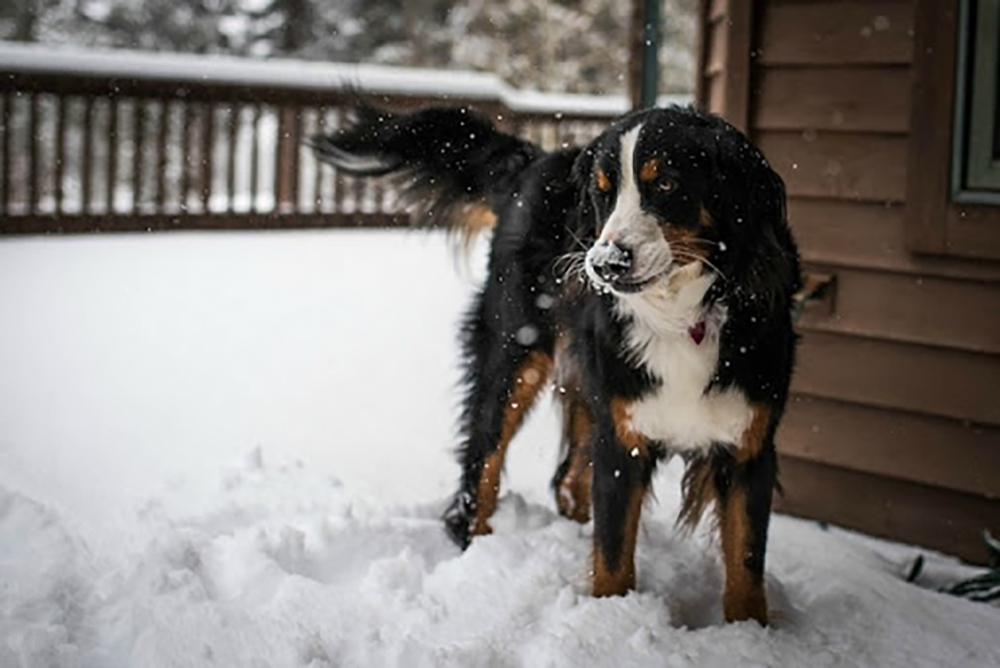Paw Prints
By Dr Mark Newkirk
While winter can be fun with snow, skiing, and more, winter also requires more attention to detail for our pets, especially dogs who go outside. Here are a few thoughts and tips on how to keep your pets safe and healthy.
First, know your dog’s limits. Some dogs love to be out in the cold, others not so much. And if it’s too cold for you, it’s probably too cold for most dogs! Short coated dogs often are more comfortable with coats or sweaters on, and they sure look cute! Some long haired dogs might need to be trimmed ( not shaved) to reduce “snow balls or ice balls” forming on their coat. Special attention needs to be focused on your pets feet, especially if they have long hair between their toes. The ice and/or snow balls can create irritation and a dog’s constant licking can also cause skin problems. Of course rock salt and other snow melt products can also cause major problems. (more on that later)
It is a great idea to wash/wipe out the toes and in-between toe surfaces when you come back inside. Warm water is fine, you should also inspect the inter-toe surfaces for rock salt or other irritants. Dry the feet! If not the dog will usually overlick/clean the toes and again might cause a problem. Inspect the feet for cuts from ice or foreign objects.
Two other options are booties and paw wax. However, many dogs refuse to walk in booties as it feels very strange to them, and you should clean off excess wax after each walk.
Remember to hit the hood or honk the horn of your car as cats often sleep in the wheel well or up inside the engine compartment. Please avoid disaster!
Winter also brings darkness early, so remember safety. Reflective gear for you and your dog, such as reflection collars and leashes are a good idea. Remember it’s slippery for cars and they may not see you in dark clothes and can’t stop in time.
Be prepared for possible electrical and heat outages, by having food, water and your pets medication easily locatable with enough supplies for a few days…just in case!
Avoid spills! Antifreeze attracts dogs and cats due to its very sweet taste. It is extremely poisonous and can cause serious illness and death if ingested as it wipes out the kidneys. Be sure to clean up any spills and make sure the cap is on tight wherever you store it.
Rat and mouse poisons are often used more in the winter time as these pests tend to move into the house as well to keep warm. Pets often will eat these baits, and they can cause severe illness. KEEP the box so that you know what tge poison is. Keep the Animal Poison Control phone number in your phone or on a refrigerator magnet. Call them first! They will have valuable information on what to tell you and your vet. New poisons come out all the time. Do not assume your veterinarian is familiar with all the poisons available.
Cold and flu season us here for people, so medications left on counters can be ingested by animals. Ingestion of human medication is actually the number ONE cause of animal poisonings nationwide. Again, call the Animal Poison Control hotline FIRST. Veterinarians are not familiar with every human meditation available and what effects it might have on the pets.
Okay, a word about “pet safe” ice melts. There is NO SUCH THING as a completely safe ice melt. There are some that are “more safe” but all can cause skin irritations and gastrointestinal problems (vomiting, diarrhea). The most ckmmkn ice melt, rock salt. Can cause hypernatremia, (severely elevated sodium in the blood), which can cause neurological problems and death. It can also cause severe inter-toe skin problems.
More “skin-safe” products are those that have ethylene glycol. However, this is the same active ingredient in antifreeze, so it is much more dangerous if ingested. Less toxic are ice melts with propylene glycol as its ingredient. It is quite safe for dogs, but cats can have red blood cell problems if ingested. Also, it is much less effective against ice and frozen snow for our sidewalks, etc, so it is not often easily found in stores.
The Pet Poison Hotline number is 1-855-764-7661. My advice is to put it in your cell phone now. They do charge a fee, so have a credit card ready, but it is well worth the price if concerned about poisoning.
Let’s all make winter safer for both animals and humans.
As a Veterinarian, Dr. Newkirk has been serving Southern New Jersey for over 38 years. He is extensively trained in medicine and surgery and also is skilled in the care of exotic pets such as reptiles and birds.












